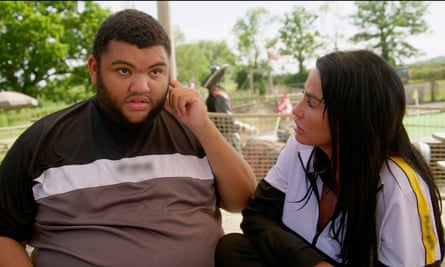The relentless belligerence of Katie Price is one of the wonders of the modern world. She could start a fight in an empty house. It’s fascinating.
In Katie Price: Making Babies, her ire is directed at her fiance Carl (“I love Kate. She gives me a headache. A migraine. But I’m still here.”), the ravages of time, the female reproductive system and the idea of being thwarted by the accumulated evidence, in the form of scans, blood tests and samples taken by her doctors, that the general laws of a 45-year-old (at the time of filming) woman’s biology apply to her too.
She is staring down the barrel of menopause but wants a baby – which would be her sixth, Carl’s first – to add to her loving if chaotic household. She and 34-year-old Carl – who reckons he was “firing blanks” during the 10 years he took steroids as a keen gym user – have been trying to conceive for three years without success, “which is amazing because I don’t feel old”. Their fertility doctor, Carole Gilling-Smith, cautions against great hopes. Even in the unlikely event that they can ripen and harvest a healthy egg, the chances of a successful pregnancy will be less than 1%.
Price, who is fundamentally an astute and pragmatic individual – though she sometimes hides the former well – says she wants to try rather than forever wonder if it might have worked. Off Carl goes with his cup. “Have a good day!” says the nurse as she leaves him with his magazines – rather sweetly (we are, remember, in the parallel universe of celebrity where things are almost the same as in the real world but also hugely different and often palpably wrong) he has brought ones containing pictures of Price in her pomp.
From what is shown during the two hours (including adverts), which is the sum total of my exposure to Carl, he seems to be drawn more from the Peter Andre end of the spectrum of choices Price has made regarding the fathers of her children (at the other end there is Dwight Yorke, who she alleges was unfaithful and has had no relationship with their disabled child, Harvey, since his birth). Carl wants to be a father and seems to have a reasonable idea of what is required to be a good one.

“Someone like me will defy the odds,” says Price. She and her 16-year-old daughter, Princess, agree that as she is still having periods, there’s every chance. (For the avoidance of doubt, this is not true. But, as Carl notes: “You [Price] tend to hear what you want to hear and I hear the facts.”)
Will it work out for the couple? And, in purely televisual terms, will you care? It’s hard to. You can’t say there is no real emotion on show here – the couple bicker and battle as honestly as you could wish to see, and then some. Price clearly adores her kids and equally obviously is as hard as nails in her professional life. And there are fleeting moments involving pregnancy tests and other news that show a slightly more tender side to her and Carl.
But it remains depthless. There is no delving into the true stresses and traumas of infertility. As she is already blessed with five children (as Price herself notes in the second episode) what we are really watching is a struggle to come to terms with reality and the possible rare thwarting of personal desire by forces beyond her control.
There is also no thought given, when the couple are pondering buying eggs from a donor (you get six at a time – “Like going to the supermarket!” says Carl) about the ethics of such a thing. They scroll through the catalogue listing their choices. A 20-year-old? Would Carl prefer someone blond even though Katie is brunette? Is this one too brainy or might it “be nice to have a little nerd?”.
This may be the point where Katie Price: Making Babies moves from merely unedifying to actively repugnant television. Or maybe not. Or maybe you got there long before – at the vaginal ultrasound, perhaps, or the sight of 10-year-old Jet, already prone to panic attacks, being part of the on-screen jamboree, or … well, let’s stop there otherwise we’ll be going all day.
In case you do care – and in case you haven’t read any of the acres of coverage the documentary has spawned, given that Katie and Carl are now an ex-couple – I won’t spoil the outcome of the treatment for you. Could either one, do you think, be truly uplifting?
